How do hormonal fluctuations during the menstrual cycle or when using oral contraceptives ("the pill") affect cognitive functions? In this episode, Franziska speaks with Prof. DDr. MMMag. Belinda Pletzer (Paris-Lodron University of Salzburg), a leading expert in cognitive neuroscience and neuropsychology, especially when it comes to hormone-brain interactions. With a diverse background spanning biology, psychology, philosophy, and mathematics, Belinda's research focuses particularly on the effects of sex hormones and gender-related aspects of neuroscience, such as the effects of hormonal contraceptives on the female brain.Together we explore if and how cognitive performance and brain activity are affected by the menstrual cycle, premenstural syndrome (PMS), and oral contraceptives. Belinda also shares her hypothesis on hormonal sensitivity across the female lifespan and whether more or actually less sensitivity could be a risk factor for mental health. As always, we conclude with an outlook on how our guest envisions the future development of the research field. Join us for a deep dive into this enlightening conversation - and find out if the myth that all women are affected by the menstrual cycle holds true...Visit the website of Belinda's research group: https://ccns.plus.ac.at/labs/sexandgender/... and Belinda's profile: https://ccns.plus.ac.at/labs/sexandgender/members/belinda_pletzer/If you would like to get in touch with Belinda, you can reach her at:
[email protected]:00:27 Introduction of Belinda Pletzer and her field of research02:20 The menstrual cycle and its phases05:18 Oral contraceptives and their influence on the menstrual cycle08:20 How do we define cognitive functions?10:24 Investigating cognitive functions - Belinda's research12:58 Does the menstrual cycle affect cognitive performance?22:28 Belinda's research on PMS, mood and cognitive performance33:08 Do oral contraceptives affect cognitive performance?41:11 Hot Topic: Hormonal sensitivity - Belinda's hypothesis46:30 Summary49:54 Closing remarks and future directions in research Outline & questions: Franziska WeinmarSound recording: Franziska Weinmar with the equipment of the IRTG2804Editing: Franziska WeinmarDo you have any feedback, suggestions, or questions? Get in touch with us:
[email protected] you intrigued by this topic and want to be kept updated? Follow us on twitter: @irtg2804 or instagram: @irtg2804 Hosted on Acast. See acast.com/privacy for more information.
